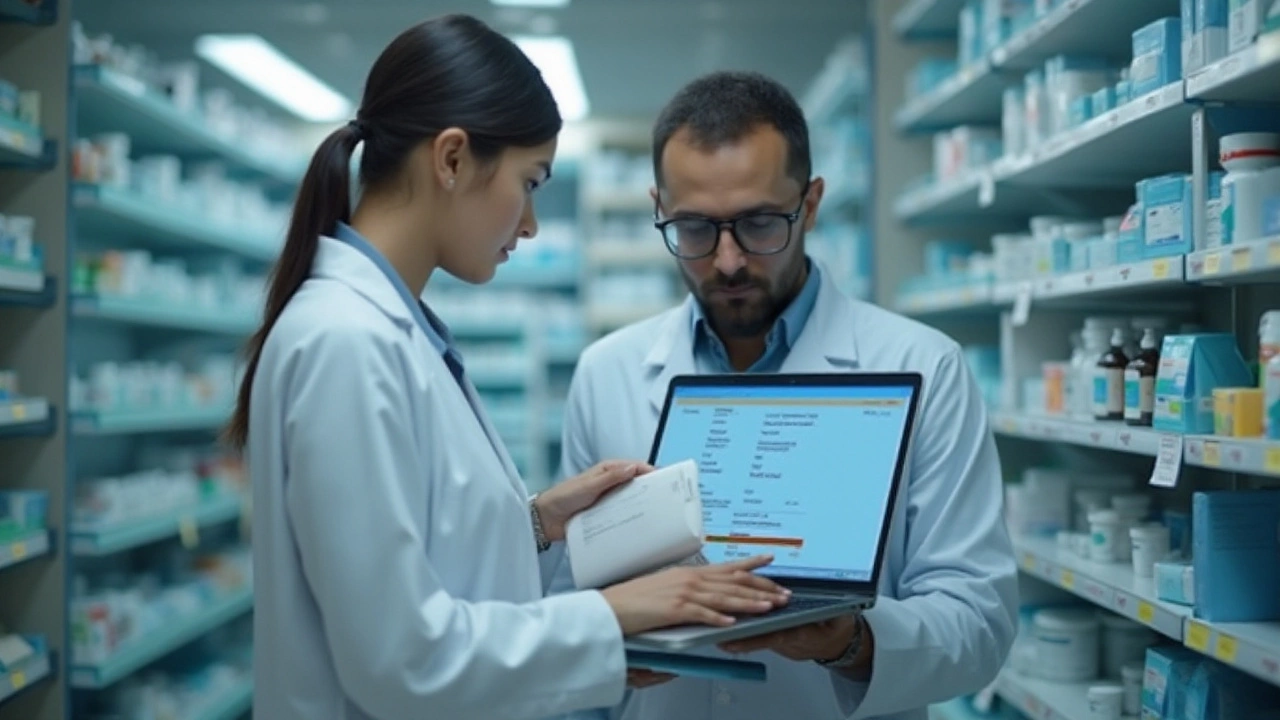The journey to acquiring a prescription has taken a transformative twist with the surge in telehealth and online pharmacies. For many, the convenience of obtaining a prescription without stepping into a doctor's office is a welcome change. The digital revolution in healthcare has simplified certain processes, but it also brings forth questions about safety, legality, and reliability.
Online services can seem daunting initially, yet with informed choices, they can be a practical solution in our fast-paced world. It's crucial to understand how these services work, what you should be mindful of, and the benefits they can provide. Whether it's through digital consultations or direct pharmacy services, this shift is part of a broader change in how we interact with healthcare systems.
By unraveling these processes, you'll discover how to best utilize online prescription services to meet your health needs without unexpected hurdles. Let's dive into this evolving landscape and see how it can fit into daily life.
- Changing Landscape of Healthcare
- The Role of Telemedicine
- Legal and Safety Considerations
- Choosing a Reliable Online Pharmacy
- Tips for Using Online Prescription Services
Changing Landscape of Healthcare
The healthcare industry is not what it used to be a decade ago. This evolution is driven by technology, consumer demands, and changing lifestyles. The increase in connectivity and technological advancements has made medical services like telehealth more accessible. Patients can now consult doctors from their homes and even obtain online prescriptions without visiting the clinic. This shift is not just convenient, but also critical for those living in remote areas or with mobility issues.
One of the most notable aspects of this change is the rise of digital platforms offering medical consultations. These platforms connect patients to licensed healthcare providers around the world. Such services break geographic barriers, providing access to quality healthcare for people regardless of their location. With just a smartphone or a computer, a person can have a video consultation similar to an in-person visit, which has proven invaluable during pandemics or natural disasters when in-person medical care can be compromised.
The speed at which this landscape is changing is unprecedented. According to a study published by the American Hospital Association, nearly 74% of people in the U.S. have used some form of telehealth services. This rising trend offers benefits like reduced travel time and costs, quicker access to specialists, and better management of chronic diseases through consistent monitoring. Telemedicine isn't just a temporary fix but a long-term solution that has integrated itself into routine healthcare practices.
"The medical model is no longer bound by brick and mortar. It's a limitless opportunity for creating a more responsive and accessible healthcare system," noted Dr. Jane Smith, a specialist in telemedicine research. Her statement encapsulates what many in the industry are witnessing – the healthcare model is transforming into a more flexible and patient-centered system.
With the evolution also comes challenges. Concerns about data privacy, security, and the legitimacy of online medical services persist. As the digital pharmacy market expands, ensuring that these platforms maintain high standards of care is paramount. Regulatory bodies are now more engaged in creating frameworks that certify the authenticity and safety of these emerging platforms. Success in this area will be crucial for maintaining patient trust and support continued growth in this sector.
Legislation and policy-making must keep pace with these rapid changes to assure everyone benefits from this modern approach to healthcare. Trust is crucial, and it's essential for technology companies and healthcare providers to work together transparently. The integration of tech into health care is a journey that's already underway, and there's no turning back. As technology continues evolving, so does its role in our health and well-being, paving the way for a future where online consultations and prescriptions are the norm, not the exception.
The Role of Telemedicine
Telemedicine has emerged as a pivotal force in modern healthcare, offering online prescriptions and consultations that significantly expand access and convenience for patients globally. This shift was catalyzed by the global events of recent years, which saw a dramatic rise in the use of digital health services. Suddenly, appointments that traditionally required in-person visits to clinics or hospitals could be accessed from the comfort of one's home, using only a laptop or smartphone. Telemedicine has become a cornerstone for those with mobility limitations, living in remote locations, or with time constraints that make traditional doctor visits challenging to schedule. It has transformed healthcare access by breaking geographical barriers and significantly reducing the time patients spend travelling to appointments. Services such as video consultations and chat-based evaluations provide diverse methods for patients to communicate with their healthcare providers, making it easier for medical professionals to collect patient histories and symptoms at the initial point of contact, often leading to quicker diagnosis and treatment planning.
The benefit of telemedicine in delivering digital pharmacy services includes the ability to maintain medical treatment continuity without interruption. This feature was particularly highlighted during lockdowns when traditional access points were heavily restricted. Digital platforms facilitate seamless consultations where patients can discuss their symptoms with licensed practitioners who can diagnose, treat, and, if necessary, prescribe medications that are sent directly to a local pharmacy or home delivery. This new model of care is not only about convenience; it's also about better resource allocation and prioritizing face-to-face consultations for more critical cases that need them the most. According to the American Telemedicine Association, virtual visits among primary care physicians rose by 154% during the early months of the pandemic. Such a leap underscores an enormous shift in both patient and provider attitudes toward technology-driven healthcare models.
"Telemedicine has consistently proven that quality care can be delivered with convenience, changing patient expectations for good." - Dr. Anita Gupta, Health Tech Expert.
Amidst this digital transformation, a critical factor remains: ensuring the safety and security of patient data. With telemedicine bridging the gap between patients and doctors, the importance of data encryption and health privacy has grown. The Health Insurance Portability and Accountability Act (HIPAA) governs telemedicine in the United States, providing strict guidelines on how patient data should be handled and shared. Internationally, various regions are adopting similar protections, ensuring that healthcare in a digital age does not compromise on confidentiality or security. As telemedicine continues to evolve, it's expected that both technological advances and regulatory frameworks will work hand-in-hand to provide more robust services that meet patient needs without sacrificing ethical standards.

Legal and Safety Considerations
Embarking on the journey to acquire online prescriptions without stepping into a doctor's office is a testament to how technology has revolutionized healthcare. However, this convenience doesn't come without its legal and safety quandaries. It's paramount to understand the laws governing these online transactions, as regulations can differ greatly from one region to another. In the United States, for instance, prescribing medicines through telemedicine services without a prior medical evaluation is generally not permitted. The distinction between legitimate online pharmacies and those operating without oversight is often murky, creating challenges for consumers trying to make informed choices. To ensure safety, it's advisable to seek services from virtual healthcare platforms certified by authorities like the National Association of Boards of Pharmacy (NABP).
Diving deeper into the regulatory framework is essential to grasp the nuances involved. Typically, legitimate online pharmacies will require a valid prescription from a licensed healthcare provider. They comply with privacy laws to protect patient information, employing secure systems to manage data exchanges. Despite advances in digital confidence, there is still a risk of data breaches. The Federal Trade Commission (FTC) routinely takes action against fraudulent sites selling counterfeit products. A rule of thumb is to steer clear of sites offering prescription drugs without any prescription — these entities often peddle dangerous counterfeits. For those unsure, consulting the Verified Internet Pharmacy Practice Sites (VIPPS) list can be an effective measure to verify the credibility of a pharmacy.
Another vital component of the legal landscape involves understanding the impact of telehealth laws on doctor consultation practices. The rise in telehealth services has encouraged many states to adapt existing healthcare laws to encompass virtual care. The Ryan Haight Online Pharmacy Consumer Protection Act is a significant federal law in this space, aiming to prevent illegal distribution of controlled substances online. It dictates that an in-person examination is crucial prior to issuing a prescription, echoing the need for balance between accessibility and safety. That said, certain exceptions exist, especially for follow-up care where an initial assessment was done in person.
Safety measures should not end with legal compliance; they extend to how prescriptions are filled and delivered. Patients must be mindful of potential drug interactions that online systems may not catch without thorough input about their medical history. Understanding these interactions is vital for those managing multiple prescriptions simultaneously. The growing field of pharmacogenomics provides a more tailored approach, potentially increasing the efficacy and safety of medications prescribed through digital means. According to recent studies, incorporating such personalized medicine could vastly reduce adverse drug reactions by aligning treatments more closely with an individual's genetic makeup.
When navigating the world of digital pharmacy services, customers play an integral role in maintaining their safety by being informed and vigilant. Health professionals often recommend keeping open communication with a primary healthcare provider even when using online services. This ensures that any digital prescription aligns with broader health management plans and considers personal health history. Research has highlighted the importance of patient education in optimizing outcomes and minimizing risks when transitioning to online healthcare solutions. As one respected healthcare executive once remarked,
"Digital health innovations offer unprecedented access, but they must be paired with awareness and caution to unlock their full potential."
Choosing a Reliable Online Pharmacy
In today's digital age, finding a reliable online pharmacy can sometimes feel like navigating a complex web filled with both genuine options and potential pitfalls. Understanding what to look for in a trustworthy service can make the difference between ensuring your health and falling victim to scams. Online pharmacies can differ vastly, and first-time users might feel overwhelmed by the sheer volume of available choices. It's critical to narrow down these options by looking for certain key criteria that signal legitimacy. Always begin by checking for official certifications or accreditations. In the United States, the Verified Internet Pharmacy Practice Sites (VIPPS) accreditation is a hallmark of quality, ensuring that the pharmacy operates under strict guidelines and regulations. Similarly, in countries with different systems, look for equivalent certifications that assure you the service is recognized by relevant health authorities.
Another crucial factor is the availability of licensed pharmacists for consultation. A reliable online pharmacy will offer access to pharmacists who can answer questions and provide guidance about medications, just as you would expect in a brick-and-mortar establishment. This feature not only enhances trust but also provides an added layer of safety, as expert advice is just a click away. Transparency in pricing and clear communication about the costs involved, including shipping and potential taxes, can also be a determining factor. Some online pharmacies might offer enticingly low prices, but hidden fees can turn these bargain buys into financial pitfalls.
Additionally, take the time to delve into customer reviews and experiences. In today’s interconnected world, feedback can provide a first-hand account of what you might expect. However, exercise caution and read reviews critically, as not all feedback is genuine. Check multiple sources to get a more balanced view. Scams can often be spotted by discrepancies in reviews or overwhelmingly negative feedback pointing out similar problems. An informed customer is a pharmacy's best ally; as someone once wisely said, "Informed buyers have a better understanding of the products they engage with."
"Informed buyers have a better understanding of the products they engage with."
Make sure you are wary of pharmacies that do not require prescriptions for medications that usually mandate one; these are typically red flags. Legitimate online pharmacies adhere to legal protocols, and if a prescription is bypassed, it could be an indication of an illegal operation. Remember, the safety of your health information is as important as the medication you receive. Therefore, ensure that the platform you choose has a solid privacy policy in place, adheres to legal standards for protecting personal data, and uses secure, encrypted transactions.
You should remember the importance of a telehealth element too. Some modern pharmacies integrate telehealth services, allowing users to connect with healthcare professionals seamlessly before purchasing medications. This not only maximizes convenience but ensures that treatments are tailored to individual needs. In the world of digital medicine, leveraging such features can ensure that an online pharmacy doesn’t merely serve as a vendor but as a partner in health. To cap it off, keep abreast of the official lists and recommendations from health organizations that flag fraudulent or illegally operating online pharmacies.

Tips for Using Online Prescription Services
In today's world, telehealth and online pharmacy services have become more than just a convenience; they're a necessity. Yet, navigating these services requires awareness and diligence to ensure your health and safety. When seeking prescriptions online, it's vital to begin by verifying the credentials of the platform you're using. Look for certifications or accreditations from reputable health organizations and ensure the site adheres to legal requirements. Many legitimate sites operate within strict guidelines, collaborating with licensed healthcare professionals to provide prescriptions.
Before diving into the realm of digital prescriptions, make sure you understand what your online prescriptions cover. A reliable platform will have a clear process for consultations, and you should have access to a licensed practitioner to discuss your health concerns. When discussing your symptoms, be as honest and detailed as possible, just like you would in a face-to-face meeting with your doctor. Having all your health information at hand, including a list of current medications and past medical history, can considerably improve the consultation's effectiveness.
According to the American Telemedicine Association, integrating telemedicine into patient care "not only improves access to healthcare but also enhances the quality of care and reduces healthcare costs."
Understanding the cost breakdown is equally important. While convenience is a huge plus, you shouldn't trade it for inflated prices. Compare the pricing of online pharmacy platforms, and don't overlook reading customer reviews on independent forums or trusted sources to gauge customer satisfaction. Transparency in costs and services is usually a good sign that the platform operates ethically. Also, check if your insurance covers online prescriptions, as this can significantly reduce out-of-pocket expenses.
When your prescription is ready, make sure you're familiar with the shipping and handling practices. A legitimate service will provide detailed information about how your medications are processed and delivered. It's essential to verify the expected delivery timelines to avoid any interruptions in your medication schedule. Additionally, secure packaging and proper storage conditions should be non-negotiable elements of the service.
Lastly, don't hesitate to ask questions and seek clarifications whenever necessary. Whether it's about drug interactions, side effects, or the service itself, thorough understanding leads to better health outcomes. Many platforms offer customer support that can assist you with queries, so use this resource to your advantage. Remember, your health is your priority, and using online prescription services responsibly can lead to improvements in how you manage it.
